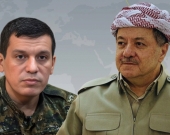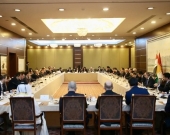Booming Erbil Poses Challenge to Security, Governor Says

“Every day people come to Erbil for its hospitals, for business, trade or tourism, which makes it easy to breach the security,” governor Nawzad Hadi told Rudaw. “So we have to improve and have long-term security plans,” he said.
Stability and a growing economy have made the Kurdistan Region a magnet for foreign and Arab businesses, he said.
“There is now tighter restriction at the main checkpoints into Erbil from the rest of Iraq, particularly on roads from Mosul and Kirkuk. It is natural to have tight security measures after an incident like that,” said the governor. “Our plans are about protecting people’s lives and government institutions.”
On September 29, an armed group of six attacked Erbil’s main security headquarters with a car bomb and handguns. Six security officers were killed and dozens more were injured.
“Erbil has grown out of the security belt that we used to have,” Hadi said. “So we have taken that into consideration and we have plans to expand the belt.”
He said that the war in neighboring Syria poses a real security threat to the entire region, including the autonomous Kurdistan Region.
“Iraq’s western borders are with Syria where Jabhat al-Nusrah and other al-Qaeda affiliated groups are active and move about,” Hadi noted. “What is happening in Syria has increased terrorism in the region.”
Hadi said that Erbil does not only rely on its checkpoints for security, but also on a network of security- and Peshmarga points scattered across the open plains surrounding the capital.
“All of our checkpoints are connected, and apart from that we have numerous Peshmarga points that together complete the security belt around Erbil,” he said.
Following the attack, some observers noted that security in the Kurdistan Region had been lax, especially at checkpoints. But the governor said that last month’s parliamentary elections had to be taken into consideration.
“We have to remember the election campaign in which many parties and people were involved,” he said. “There had to be movement between the cities, travel had to be made easy.”
Hadi said that the impact of new restrictions at the checkpoints, which include questioning and search, had already been felt in the number of tourists coming to the Kurdistan Region. During the Eid holidays last week, 14,500 tourists, mainly from other parts of Iraq had visited Erbil, compared with 21,000 last year.
Hadi said that Kurdistan’s intelligence department has played a major role in countering “terrorist” groups threatening the Kurdistan Region.
He added that as part of new security plans for the rapidly expanding city, laborers who arrive from the rest of Iraq have to undergo thorough background checks.
“For instance, we are looking at how laborers used to come here from rest of Iraq,” he explained. “Now we have to change the pattern. It may affect the security situation.”
The Erbil attack was a rare occurrence for the Kurdistan Region, which remains the only oasis of calm in an otherwise violent Iraq. The last major attack in Erbil happened in 2007, when militants targeted the same target.
RUDAW












